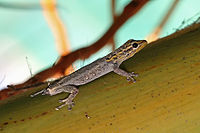
Photo from wikipedia
Chemical cues from predators (kairomones) are used by many aquatic and terrestrial animals when deciding on behavioral responses to predation threats. These responses may also be affected by the animal’s… Click to show full abstract
Chemical cues from predators (kairomones) are used by many aquatic and terrestrial animals when deciding on behavioral responses to predation threats. These responses may also be affected by the animal’s physiological state (e.g., nutrition level, parasitism, or prior injury), which could alter normal responses to kairomones. In this study, we examined effects of leg autotomy (the voluntary sacrifice of a leg) on subsequent responses to predator chemical cues in females of the riparian-zone wolf spider Pardosa valens. In a fully-crossed design, spiders with all legs intact or with one leg removed were exposed to one of two cue treatments for 90 min: a control (no predator cue) or one with chemical cues (silk and excreta) from a larger sympatric wolf spider, Rabidosa santrita. We then introduced an R. santrita into each container, and recorded subsequent survival of P. valens. Survivorship was significantly higher for individuals previously exposed to predator cues than for those in the control group; however, autotomy had no effect on survivorship, which was similar for both intact and autotomized spiders in both the predator-cue and control treatments. In addition, although P. valens were more likely to be found off the substrate than on it when the predator was added in each of the four treatment pairings, this initial position did not influence survivorship. These results therefore indicate that P. valens can behaviorally respond to predator kairomones in ways that reduce their risk of predation, but that this response is unaffected by the prior sacrifice of a leg.
Journal Title: Journal of Insect Behavior
Year Published: 2018
Link to full text (if available)
Share on Social Media: Sign Up to like & get
recommendations!